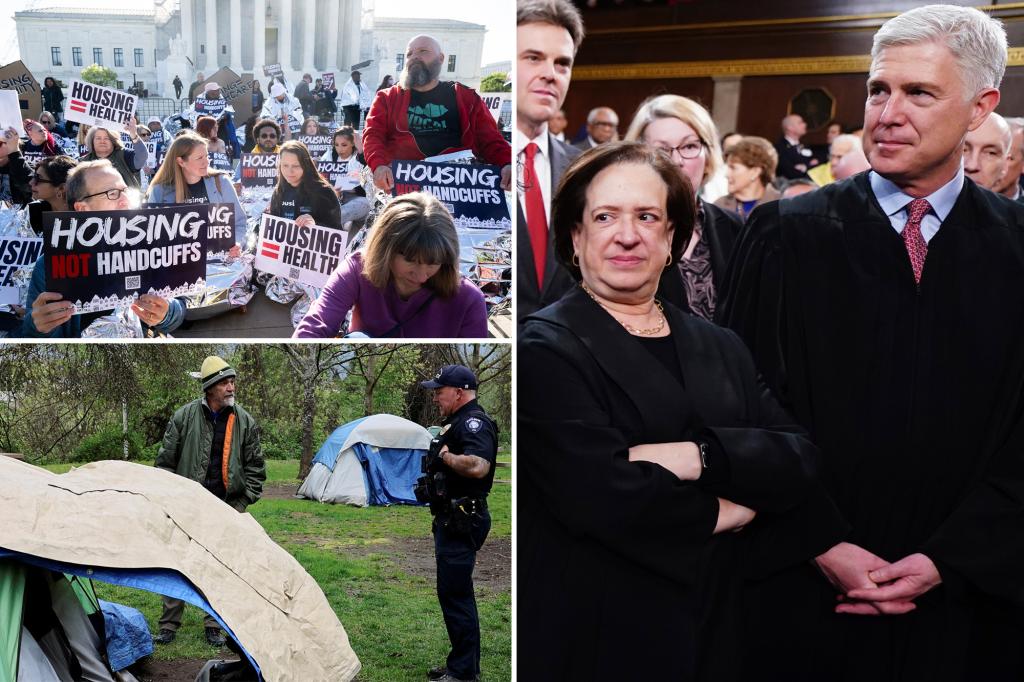Summarize this content to 2000 words in 6 paragraphs
The Supreme Court appeared poised Monday to clear the way for cities across the US to restrict homeless encampments by allowing local laws that ban public camping to take effect.
The case, which revolves around a challenge to an ordinance in the southern Oregon city of Grants Pass, is the most significant on the issue to come before the court in decades as official stats show record numbers of Americans are out on the street.
The Grants Pass measure bars camping or sleeping on public property or city parks, while defining a campsite as “any place where bedding, sleeping bag, or other material used for bedding purposes, or any stove or fire is placed.”
Violators initially face fines of at least $295, but repeat offenders may be banned from a city park for 30 days. If someone violates a ban order, they can be charged with criminal trespass, punishable by up to 30 days in jail and a $1,250 fine.
Advocates say the Grants Pass measure violates the Eighth Amendment’s prohibition on cruel and unusual punishment, and a three-judge panel of the Ninth Circuit Court of Appeals agreed, ruling in a September 2022 split decision that Grants Pass could not issue citations for “the mere act of sleeping outside … or for sleeping in their car at night, when there was no other place in the City for them to go.”
However, local officials of both parties contend that the lower court rulings make it difficult for them to manage encampments, which can have dangerous and unsanitary living conditions.
Both liberal and conservative justices noted the thorny policy problem, with Justice Neil Gorsuch musing at one point: “You end up in jail for 30 days, then you get out, you’re not going to be any better off than you were before in finding a bed.”
“It’s a policy problem because the solution, of course, is to build shelter, to provide shelter for those who are otherwise harmless. But municipalities have competing priorities,” said Chief Justice John Roberts.
Roberts then asked deputy Solicitor General Edwin Kneedler, arguing against the Grants Pass rule: “Why would you think that these nine people are the best people to judge and weigh those policy judgments?”
The chief justice also asked whether towns could move homeless people to another town if shelter was available there, prompting Kneedler to warn that such a practice would amount to “banishment” without proper due process.
Gorsuch then asked whether individuals should have a right to defecate in public if no restrooms are available, with Kneedler countering that the government has made no argument for such a right and noting public health concerns.
The conservative justice also asked whether the Eighth Amendment would outlaw punishment for stealing food if shelters were empty.
Kneedler responded by referring to a key precedent in the case, 1962’s Robinson v. California, in which the court ruled the status of addiction to narcotics could not be criminalized, but the action of drug use could.
“Is being a bank robber a status?” Roberts asked at another point while grilling Kelsi Corkran, another lawyer challenging the Oregon ordinance.
By the end of arguments, the chief justice, Gorsuch and fellow conservatives Samuel Alito and Clarence Thomas appeared swayed to the Grants Pass side.
The three liberal justices were more openly against the Oregon measure, with Justice Sonia Sotomayor asking at one point of homeless people: “Where are they supposed to sleep? Are they supposed to kill themselves not sleeping?”
Sotomayor also asked why “stargazers” or individuals who fall asleep on a public beach “are not arrested, but homeless people are.”
“For a homeless person who has no place to go, sleeping in public is kind of like breathing in public,” Justice Elena Kagan argued at another point.
Last year, about 650,000 individuals in the US lacked a permanent place to live, according to the Department of Housing and Urban Development, a 12% increase from 2022 and the most since tracking began in 2007.
California Democratic Gov. Gavin Newsom, whose state has been the epicenter of the crisis, pleaded with the Supreme Court last month to uphold the Grants Pass law.
“Encampments are dangerous — period … Our best efforts are being blocked because of sweeping injunctions that delay progress and fail to provide any consistent guidance for local authorities to abide by,” Newsom said.
“The United States Supreme Court can establish a balance that allows enforcement of reasonable limits on camping in public spaces, while still respecting the dignity of those living on our streets.”
The Supreme Court is expected to make a decision in City of Grants Pass v. Johnson by the end of June.













